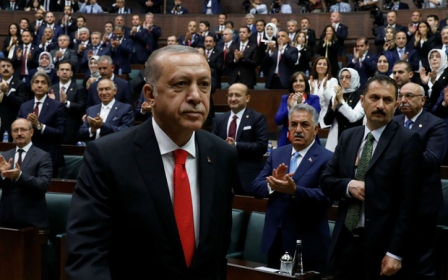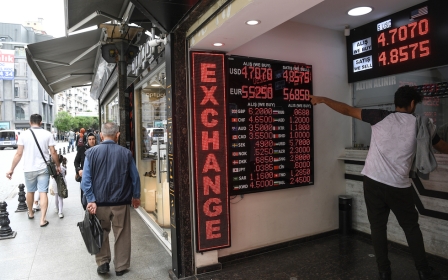Erdogan sworn in as Turkish president with sweeping new powers

Turkey's Recep Tayyip Erdogan fulfilled a long-held ambition on Monday when he was sworn in as president with sweeping new powers over a country he has dominated and reshaped during his 15-year rule.
"As president, I swear upon my honour and integrity, before the great Turkish nation and history, to work with all my power to protect and exalt the glory and honour of the Republic of Turkey," Erdogan told parliament as he took the oath of office.
Launching the executive presidency that he fought hard to secure, Erdogan will later Monday appoint a streamlined cabinet he says will push for growth to make Turkey one of the world's biggest economies.
Erdogan narrowly won a referendum last year to replace his country's parliamentary democracy with a system featuring an all-powerful presidency, and followed that with a hard-fought election victory last month for the newly strengthened post.
He says the changes, the biggest overhaul of governance since the modern Turkish republic was founded from the ruins of the Ottoman Empire almost a century ago, are needed to drive Turkey's economic growth and guarantee its security.
Following his swearing-in, the new president will attend a ceremony at the huge presidential palace he has constructed in the capital.
The ceremony will be attended by 22 heads of state and 28 prime ministers and parliament speakers from different countries, as well as representatives of various Turkish institutions, state-run Anadolu news agency reported.
Attending heads of state include the presidents of Pakistan, Somalia, Bosnia and Herzegovina, Georgia, Venezuela, Zambia and Moldova, and the emir of Qatar.
Political and religious representatives from the countires in the Balkans, the Caucasus and Central Asia will also attend the ceremony.
Under the constitutional changes, the post of prime minister will be scrapped and Erdogan will select his own cabinet without parliamentary approval. He will have a greater say in ministries' work, and can remove civil servants at will.Erdogan has said he will announce his new cabinet on Monday night, promising to make appointments from outside parliament and slim down his ministerial team to 16 from more than 20.
As a result of the new policy, any MP that Erdogan picks for his new cabinet would be obliged to resign from the parliament, decreasing the number of seats for his Justice and Development Party (AKP) until a by-election is held.
The AKP lost its single-party parliamentray majority in the 24 June elections, winning 295 seats. However, it retains control over the legislative body thanks to its "People’s Alliance" with the Nationalist Movement Party (MHP).
Coup, crackdown and authority
Erdogan's supporters see his new powers as just reward for a leader who has championed the pious working classes and built airports, hospitals and schools.
"Turkey is entering a new era with the presidential oath ceremony on Monday," Erdogan told his ruling AKP party at the weekend. "With the power granted to us by the new presidential system, we will get quicker and stronger results."
Opponents say the new powers mark a lurch to authoritarianism, accusing Erdogan of eroding the secular institutions set up by modern Turkey's founder, Mustafa Kemal Ataturk, and driving it further from the values of democracy and free speech.
On the eve of Monday's inauguration, authorities dismissed more than 18,000 state employees - most of them from the police and army - in what the government said would be the final decree under emergency rule imposed following a failed 2016 coup.
More than 150,000 state employees have lost their jobs in the crackdown following the coup attempt, and Turkey's interior minister said in April that 77,000 have been formally charged and kept in jail during their trials.
Since taking office in 2003, first as prime minister and later as president, Erdogan has dominated Turkey, tightening his grip over the country of 81 million people as he tamed rival power centres including the military, which toppled some previous governments.
Under his leadership, Ankara started accession talks with the European Union, which stalled amid EU criticism of human rights in Turkey. Ties with the United States and other NATO partners also frayed, but Turkey remains crucial for any hope of stability in Syria and Iraq and managing refugee flows to Europe.
A powerful campaigner, he is Turkey's most successful and divisive leader in recent history. Erdogan has prevailed in a dozen local, parliamentary and presidential elections.
Economic emphasis
On Saturday, Erdogan said he would tackle high interest rates, inflation and a wide current account deficit. "We will take our country much further by solving [these] structural problems of our economy," he said.
Inflation surged last month to more than 15 percent, its highest level in more than a decade, despite interest rate hikes of 500 basis points by the central bank since April. The lira has also fallen by a fifth in value against the dollar this year.
Erdogan has described high interest rates as "the mother and father of all evil," and said in May he would expect to wield greater economic control after the election.
Following his victory in the polls two weeks ago, Erdogan said he would spare no effort to spur economic growth.
"There is no stopping for us until we bring Turkey - which we saved from plotters, coupists and political and economic hitmen, street gangs and terrorist organisations - to among the top 10 economies in the world," he said.
Middle East Eye propose une couverture et une analyse indépendantes et incomparables du Moyen-Orient, de l’Afrique du Nord et d’autres régions du monde. Pour en savoir plus sur la reprise de ce contenu et les frais qui s’appliquent, veuillez remplir ce formulaire [en anglais]. Pour en savoir plus sur MEE, cliquez ici [en anglais].





